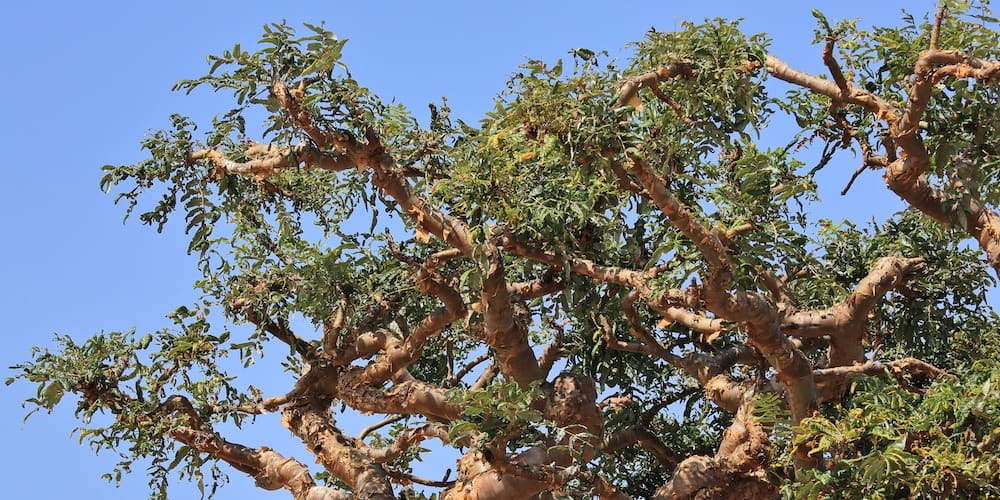BENEFITS OF BOSWELLIA
✓ Powerful anti-inflammatory
✓ Relieves pain
✓ Improves asthma symptoms
✓ Supports healthy intestinal function
✓ Strengthens the immune system
What is boswellia?
In botany, the genus Boswellia comprises around twenty species of trees. Among the most well-known are Boswellia dalzielii, Boswellia sacra, and Boswellia serrata. Growing in Africa or Asia, these trees share a common feature: their aromatic resin is harvested to produce incense.
When referring to boswellia in herbal medicine, we particularly mean boswellia serrata, which is native to India. Although it is indeed an incense tree, it is also used for its medicinal properties as it is a potent natural anti-inflammatory and pain reliever.
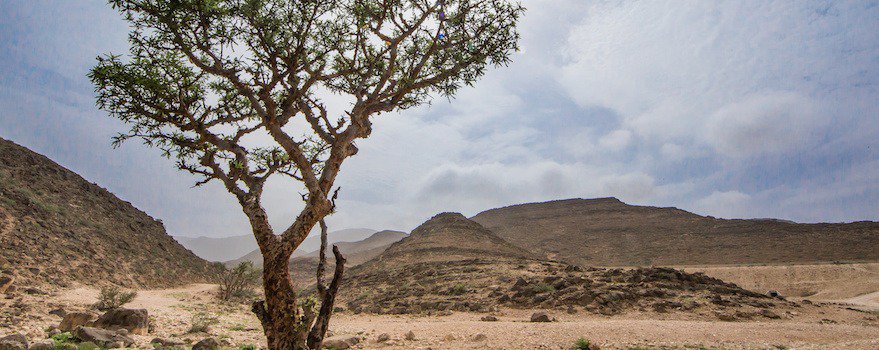
Boswellia is a gnarled tree that thrives in the sandy and dry soils of desert regions. With great resilience, it withstands both drought and heat. In its natural habitat, it can reach heights of up to 8 meters. From June to August, it produces pale yellow flowers, which later give way to small fruits.
However, neither the leaves, the flowers, nor the fruits contain the tree’s active principles. It is in the resin that the true treasure of boswellia is found. Extracted from the trunk, it is harvested in summer and autumn. In India, it is known as ‘Salai guggul’ when used alone, or ‘Indian Olibanum’ when combined with other Indian plants such as turmeric, for example.
Scientific research has greatly contributed to the growth and popularity of boswellia. It is a remarkable anti-inflammatory and also a powerful pain reliever due to its analgesic properties. It increases the pain tolerance threshold.
Used in India for over 4000 years, boswellia and its consumption are gradually expanding in Europe. So much so that it is now considered one of the most potent natural anti-inflammatories, alongside turmeric, ginger, or moringa. It is most often consumed as a dietary supplement (tablets, capsules, powder).
Nutritional composition
- Pentacyclic triterpenic acids: boswellic acids including acetyl-11-keto-beta-BA (AKBA)
- Tetracyclic triterpenic acids
- Antioxidants
- Polysaccharides: arabinose, galactose, xylose
- Incensole acetate
- Essential oils
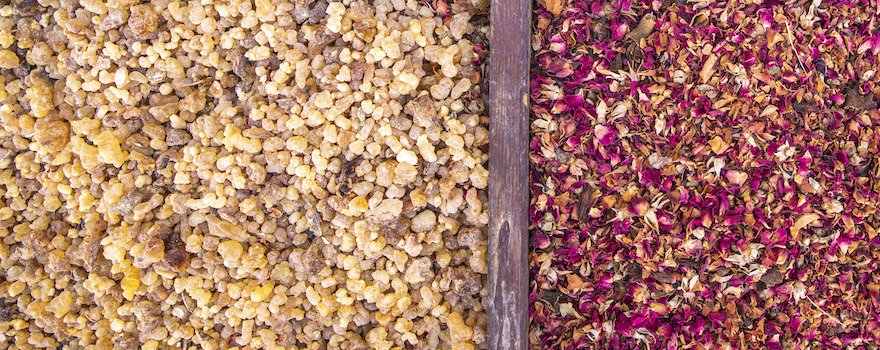
The benefits of boswellia
🌵 Powerful anti-inflammatory
The main reason boswellia is of such interest today is its potent anti-inflammatory action. In traditional Ayurvedic medicine, it is used to reduce inflammation related to certain conditions, such as osteoarthritis, rheumatoid arthritis, Crohn’s disease, and intestinal inflammation.
The boswellic acids are the active anti-inflammatory substances in the resin, particularly the pentacyclic triterpenic acids. To reduce inflammation, these acids act in two phases.
Initially, they inhibit the formation of leukotrienes. These lipids are inflammation mediators and also cause oxidative damage. Boswellic acids block the production of leukotrienes by acting on the enzyme 5-lipoxygenase (5-LOX).
In the second phase, boswellic acids contribute to the proper functioning of blood vessels and improve blood circulation to tissues and joints. Thus, boswellia aids in faster disappearance of inflammation.
This study, conducted by Italian researchers, was carried out on patients suffering from psoriasis or erythematous eczema, inflammatory skin diseases. The boswellia serrata resin extract improved itching and erythema in 60% of cases, thanks to the suppression of leukotriene formation via the enzyme 5-LOX.
This study from the Indian Institute of Natural Resins and Gums shows how boswellia can be a promising anti-inflammatory agent for treating various inflammatory diseases.
💆♂️ Relieves pain
In addition to directly suppressing inflammation, boswellia relieves associated pain thanks to its analgesic effect. Here again, it is the boswellic acids that provide such effectiveness.
In cases of arthritis, osteoarthritis, or other inflammatory joint diseases, it relieves pain, reduces swelling, sensations of stiffness, and heaviness. It also counters the decrease in joint flexibility.
This study from the Nizam’s Institute of Medical Sciences in India, conducted on 12 patients, showed that boswellia significantly increased the pain tolerance threshold compared to placebo.
🌬 Improves asthma symptoms
Since boswellia possesses anti-inflammatory properties, it has been researched for the treatment of asthma. Indeed, asthma is a respiratory disease due to inflammation of the bronchi.
By inhibiting the production of leukotrienes, boswellic acids reduce bronchoconstriction, meaning the contraction of bronchial muscles, leading to breathing difficulties. They also act on the NF-KB reaction chain, which, when uncontrolled, can trigger asthma.
This study from Liaocheng People’s Hospital in China, conducted on mice, shows that boswellia extract reduced airway inflammation and inhibited the release of Th2 cytokines, pro-inflammatory molecules involved in asthma.
♻️ Contributes to good intestinal function
Thanks to its anti-inflammatory action, boswellia is very interesting for the entire gastrointestinal sphere. It combats in particular chronic inflammatory bowel diseases (IBD) like irritable bowel syndrome, ulcerative colitis (UC) or Crohn’s disease.
In this study from the University of Athens Medical School, conducted on 20 patients with ulcerative colitis, boswellia led to disease remission in 14 patients (compared to 4 patients in the group that received sulfasalazine, an intestinal anti-inflammatory).
🛡 Strengthens the immune system
Boswellia stimulates and protects the immune system. Boswellic acids act on the production of antibodies (immunoglobulin G) to fight against various bacterial and viral infections. It also regulates the production of white blood cells (lymphocytes), thus preventing the onset of autoimmune diseases.
This study from the University of Tuebingen in Germany explains how boswellia serrata extract and boswellic acids can have beneficial effects on the immune system.

How to consume boswellia?
Boswellia in tablets
Boswellia resin extract is most often offered in the form of tablets or capsules. To fully benefit from its advantages, the concentration of boswellic acids should be sufficiently high (at least 70% boswellic acids).
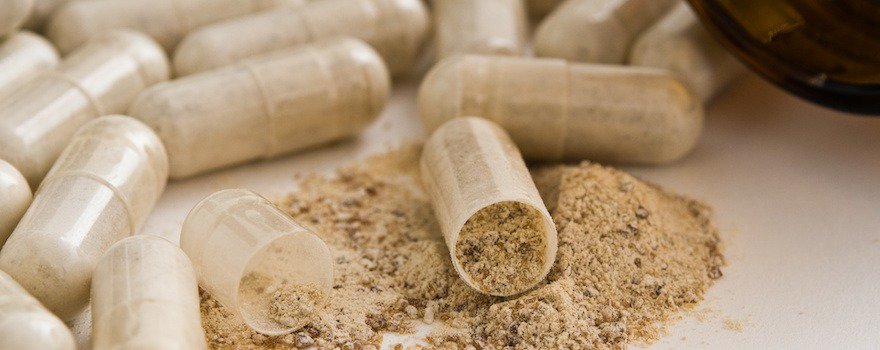
Boswellia in powder
You can also find boswellia resin reduced to powder, to mix with water, fruit juice, or yogurt. Thanks to its essential oil content, it has a pleasant taste although slightly bitter. This form is often less concentrated in boswellic acids.
Boswellia essential oil
Boswellia essential oil is not for consumption. It is used solely in topical application, diluted in a vegetable oil, for its healing and regenerating properties.
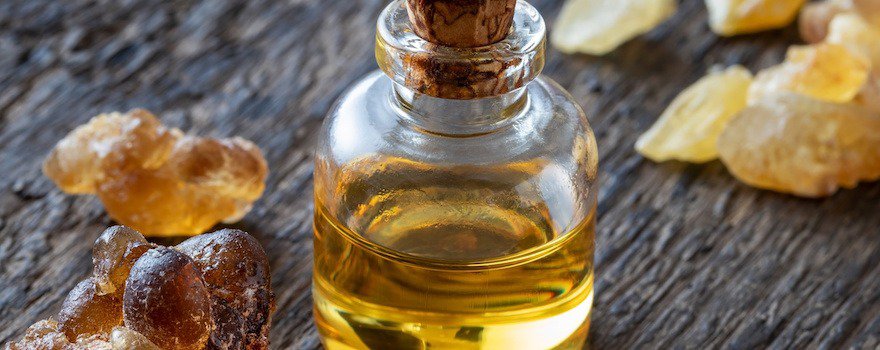
Boswellia in incense to burn
Boswellia incense can be diffused in the home to calm the mind, reduce stress, clear the airways, and purify the atmosphere.
Boswellia and turmeric
It pairs perfectly with turmeric, a plant with anti-inflammatory properties. They work synergistically to reduce inflammation and relieve pain, especially in cases of arthritis. Boswellia and turmeric can therefore be taken together for better results. Our tree also pairs with horsetail, meadowsweet, or devil’s claw.
Dosage of boswellia
⚖️To relieve occasional inflammation, it is recommended to consume between 600 and 900 mg of boswellia per day.
⚖️To treat an inflammatory condition (osteoarthritis, arthritis, bowel inflammation…), the dose can go up to 1200 mg per day.
⏳Boswellia must be taken with meals, in 3 doses. The first results usually appear after 2 to 4 weeks.
⏳It’s possible to do courses of 2 to 3 months to act deep on inflammation. Make sure to space each course a few days apart.
💊In tablets: up to 3 per day for tablets or capsules of 400 mg
🥄In powder : 1 level teaspoon per day
💧In essential oil : for external use only. Apply to the skin, previously diluted in a vegetable oil.
Contraindications and side effects
The consumption of boswellia is contraindicated for the following people:
- As a precaution, pregnant or breastfeeding women should not consume it.
- Its use is discouraged for children under 18 years.
- To avoid interactions between boswellic acids and certain medications, people under treatment should seek their doctor’s advice.
Some side effects may appear after consuming boswellia, but they are rare. The following adverse effects have been recorded:
- Gastrointestinal disorders.
- Acid reflux.
- Nausea.
- Increased urination.
- Skin reactions.
If symptoms persist, it is advised to stop consumption and consult a doctor.
History, culture, and market of boswellia
A venerated resin

Burned during religious ceremonies, boswellia resin is a precious substance in Ayurvedic medicine. In Sanskrit, it is called “Gajabhakshya,” referring to the strength it provides to the men and animals who consume it.
In Ayurvedic medicine, boswellia is used alone or combined with other Indian plants. It is also used externally to treat skin problems.
But its use is not limited to India. It is also found in the Arabian Peninsula, Ancient Egypt, and in Greek and Roman Antiquity.
In Europe, it is from the end of the 20th century and thanks to the discovery of its active principles that boswellia is consumed again. Boswellia from southern Oman is now in high demand.
Resin harvesting
Each tree produces about 10 kg of resin per year. The harvest follows a specific protocol.
During sap rise, in summer and autumn, the trunk or branches of boswellia serrata are delicately incised. A milky sap then flows out, which, in contact with air, hardens to form resin. The drops are collected and once solidified, stored in baskets. The resin will either be burned, like incense, or used for the production of dietary supplements (capsules, powder…) or essential oils.
In the markets of Oman, the whitest and purest pieces can reach up to 60€ per kg.
Dossier prepared by Julia Perez and Charlotte Jean
Sources and scientific studies
Stefano Togni, Giada Maramaldi, Francesco Di Pierro, Massimo Biondi, 2014. A cosmeceutical formulation based on boswellic acids for the treatment of erythematous eczema and psoriasis.
M. Z. Siddiqui, 2011. Boswellia Serrata, A Potential Antiinflammatory Agent: An Overview.
K. Prabhavathi, U. Shobha Jagdish Chandra, Radhika Soanker, P. Usha Rani, 2014. A randomized, double blind, placebo controlled, cross over study to evaluate the analgesic activity of Boswellia serrata in healthy volunteers using mechanical pain model.
Zhimin Liu, Xiaoyun Liu, Lili Sang, Haifeng Liu, Qinghua Xu, Zhehui Liu, 2015. Boswellic acid attenuates asthma phenotypes by downregulation of GATA3 via pSTAT6 inhibition in a murine model of asthma.
Aikaterini Triantafyllidi, Theodoros Xanthos, Apostolos Papalois, John K. Triantafillidisc, 2015. Herbal and plant therapy in patients with inflammatory bowel disease.
Ammon HP, 2010. Modulation of the immune system by Boswellia serrata extracts and boswellic acids.


